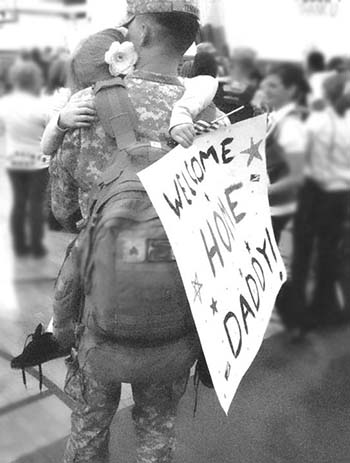by Cathy McCarthy, Operation Homefront, Navy veteran and military spouse
The email that Operation Homefront received began the way that many do, with a thank you for assistance we have provided. It included the common refrain we’ve seen many times over 14 years of providing emergency assistance to military families.

“I have friends that have had a water heater rupture and flood their house, another their washing machines quit, another house payment problems, another car payment problems and we have left our wives/husbands with the entire load to manage.”
The Murphy’s Law of Deployments. Something many of our military families are intimately familiar with. If it can break, it will, and it will do so as soon as your service member leaves on deployment.
As a Navy wife, I experienced the car breakdowns. The sick children. Calling a neighbor at 5 am because I threw out my back and couldn’t pick up my baby. The appliances going kaput. And more than my fair share of shower cries.
But it is what the next two sentences said that gave me the most pause…
“The stress on these families can be unbearable. Some of us will not make the reintegration back into our families.”
There it is. In black and white. The worst fear of many a military couple, but one too often not confronted, or one we shove to the back of our minds or one we pretend does not exist. The specter that the stress, from years of deployments, or years of trying to recover from combat wounds (both seen and unseen), will eventually tear the family apart.
A RAND corporation study in 2013 looked at 462,444 enlisted service members who married while serving in the military from March 1999 to June 2008. “Researchers found that cumulative months of deployment matter. More cumulative months of deployment increased the risk of divorce among military couples, regardless of when the couple married or when the deployment occurred. The risk of divorce was higher for hostile deployments than for non-hostile deployments, and women were always more likely to divorce than male service members as a result of time in deployment.”
But what sticks out the most from this study is that 97 percent of the divorces occurred after a return from deployment.
There are some things that programs and pamphlets can’t fix. But, together with many of our partner organizations and fellow travelers in the non-profit world, we hope we can help do something to change the odds. If we can be there for the spouse and children of a deployed service member when the heating goes out in the dead of winter, or provide respite and a shoulder for a caregiver, or give a veteran a place to transition or a forever home, then we remove one burden. Perhaps that one thing gives the family time to breathe and regroup and focus on themselves.
We are lucky to live how we do thanks, in no small part, to the service of our men and women in uniform. It’s a debt we can never repay, and for some, we will owe in perpetuity. But the times we can repay, we should. In whatever way we can keep the stress and effects of war from becoming too great, we should.
Helping build strong, stable and secure military families is how we truly say “Thank you for your service.”

